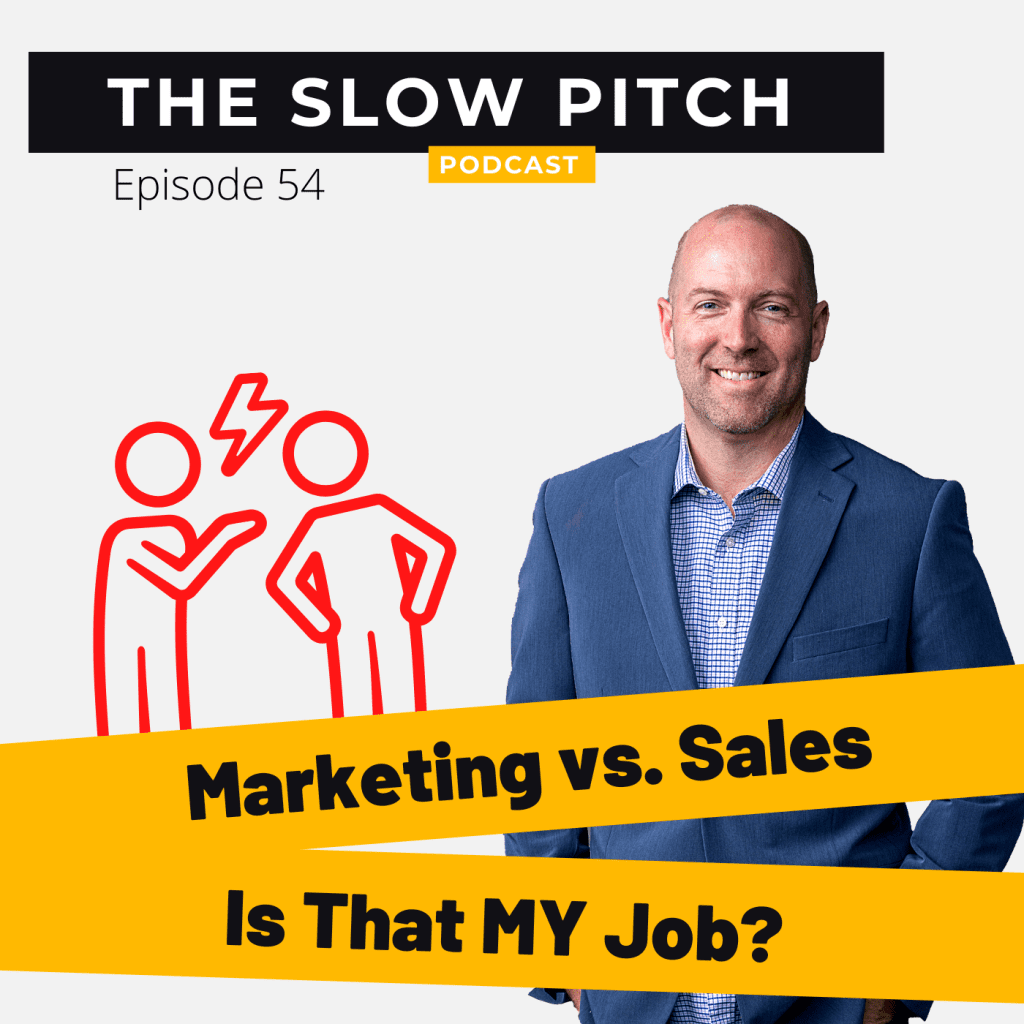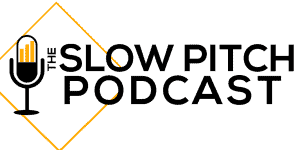How Does Marketing Impact Sales? 3 Ways They Impact Each Other


Notes
Marketing? Sales? What Impacts What?
What makes a sale happen? Is it marketing? Is it the salesperson? Is it both? What can we learn from the marketing ‘department’ in sales?
No matter which department you work, you need each other. Someone once asked us, “Yeah, but which one is more important and does marketing really impact sales? Don’t I make the sale?” Obviously, they were a salesperson who knew their role but discounted their counterpart’s role.
In this episode, we talk about the difference between the two, and how one impacts the other. If you are in a company with two departments you may have heard someone say, “That’s their job (speaking about the other department).” While this may be true in it’s purist form, both are, in fact, responsible.
We talk about the example of when marketing is done, what is it’s purpose, and what happens once there is interest. After that, the sales team should kick in and begin the process of identifying whether the potential buyer really needs the product or service being sought out. If it’s a good fit, the sales process should begin. If it’s not a fit, it’s time to thank them for their time and move on.
Knowing when to move on is critical to your success in the long-run. If you don’t know how to eliminate potential buyers early, you’re wasting time. I know that sounds harsh because you want to help people or you don’t want to eliminate a lead, but it’s true. Any good salesperson will tell you that the moment they realized that, they faster they made more money. It’s a little counterintuitive.
One thing we also learn from the marketing side is that they track every stat. The same should apply to the sales team. Every stat needs to be tracked so that everyone knows where each lead stands and how likely they are to close. Without tracking the stats, we’re just guessing. That should be the same for both silos.
That said, marketing is an important arm in your sales process. Never forget that. Without it, you’ll likely be speaking to far too many people that are not interested in your product or service.
Sales is about asking questions to eliminate a possible lead. Marketing is about eliminating those who don’t want the product/service.
Related Episodes:
What Makes A Successful Sales Team? 3 Tips to Nurturing Your Team.
What Makes A Great Salesperson? And What Makes a Good Salesperson? (How are they different?)
How to Find Pain in Sales. What Is Pain in Sales?
Related and Source Information:
Difference Between Sales & Marketing in 2021
The “Sales and Marketing” Role
Music: “Clydesdale Funk” by Cast of Characters, written by: Dustin Ransom.
Some links may be affiliate links where we get compensated for suggesting with no additional cost to you.
The Episode
Rob 00:07
Welcome back, everybody to The Slow Pitch. And today we’re going to talk about the difference between sales and marketing. There’s a subtle difference between the two and we’re gonna get into that right now.
V/O 00:20
This is The Slow Pitch Podcast.
Rob 00:24
First sales, you’ve got to think about it as it’s happening right now, like it’s an in-person over the phone, something’s happening right now, there’s an interaction happening right now. That’s what it’s is all about. You’re focused on this transaction, it’s a one on one, it’s a one with many, whatever that might be. But there’s some sort of an interaction, it almost has to come across as being like an opportunity, it has to come across as genuine caring from the salespersons perspective about taking care of the potential buyers problem, right? It has to be something that the salesperson feels comfortable knowing that the solution that they’re providing is going to solve the problem, it is a two way conversation, it’s really driven by that interaction between two different people. And in my opinion, it can be a short or long term result based on that conversation.
So in the end of that conversation, it could go one of two ways, it could go with that as the end of the conversation, and we are never talking again. Or it could be hey, this is the end of the conversation and we are going to talk again about X, Y, and Z, which is the hopeful side, right. But if it’s also a no, no, get lost, we don’t want to talk to you anymore.
That’s not a bad thing, you know that that person is not interested and you are no longer need to deal with or work through interacting with that person hoping that you’ll get something on the other end. Not that you can still have that conversation…and really what you’re what you’re in that conversation trying to do is really building up that rapport, helping understand who that client or potential client is, and really thinking of it in terms of bringing the conversation to the next step. And by bringing you to the next step, you’re bringing it to the next step of closing the sale and making them purchase something.
Rob 02:14
Now let’s flip over to marketing, It a lot of times really focuses on the future, this is something that is happening in the future, this is something that’s put out there, and you hope that somebody responds to, or hope that somebody comes back to you to make that initial conversation in the commerce side. So it’s something that’s centered on sending information out, pushing information out, and it’s to multiple people at the same time, versus what sales is, which is mostly a one on one conversation.
Or if it’s one with a couple of people from the organization, that’s the other way to do it. But it usually is one potential client, meaning that company that you’re selling to or that person that you’re selling to, it’s not you’re not like in marketing, where you’re where you’re really driving to send a message out to multiple organizations, or multiple people that are unrelated. That’s where this marketing comes in. That’s what it becomes.
It is also a strategic thing, versus something where you’re in the conversation and you’re already engaged. So a strategic meaning you’re putting yourself in their world, in front of the right people. It doesn’t make people buy, it’s what it does is it pulls people in so that the salesperson can interact and make that sale so that the person can buy. Marketing is also kind of like changing all the time.
Whereas the sales side, you really should be kind of using the same approach all the time, use the same process so you know where that person stands and where they are, versus marketing, you’re going to change, maybe a little different messaging, maybe you’re going to end up using this piece in a different location, meaning you’re going to market something on YouTube versus advertised on TV. Or if you’re going to market in a magazine versus a newspaper, that changes all the time.
And it’s really a one way conversation on the marketing side. Whereas a two way conversation on the on the other side, right. And it is really a lot of times if it’s done correctly, it’s done using a way of measuring the success.
I submit to you that they should also have some metrics applied to it, where you can measure your success rate, each step of the way to say I either made or did not make the next step, meaning closer to the sale. You should be measuring those things, but marketing is 100% all metrics driven. And that should be translated my opinion over the sales side.
Rob 04:32
The goal of marketing is to essentially have long-term success. So it’s constantly bringing new potential clients in to be brought to the salesperson to be able to sell although I would look at this as a salesperson as more of a little bit of a longer term relationship. It really is once it’s sold, unless you’re doing some repeat business with that person all the time, depending on your role, depending on your role, depending on what you’re doing and what you’re selling and how you fit, you’re either going to create and foster a longer term relationship after that sale, or it’s going to be a sale and then you’re done, you’re moving on to the next person that brought it was brought into the company, right as a lead.
So marketing, the goal is really that bringing the lead in so that you can then as a person who sells, work the sale. The marketing side should also be educating the potential buyer so that they understand what the product or services that they’re buying, they need a high level understanding of what this product or service is, so that they can feel comfortable saying yes, I want to make this call, or I should reach out via a web email me form, right? That’s where the marketing, that’s what their goal is, versus a commerce side, which is, what are you looking for? And is this something that I can actually sell, there’s a see the subtle difference. It tells people, this is what we do.
Sales says, hey, I’m not sure we know if we know that we that we can do what you need, but what is it you’re looking for, maybe we can help you, that’s kind of the approach you should be having with a sales call with the goal of reaching the widest audience possible, so that you can bring them in right? You don’t want the widest possible or you want people that are interested in buying, that’s the goal of those marketing team, their job is to bring you people who are interested in once you have them interested, then it’s your job to convert them over to a sale.
They also will attract people to the product, but that doesn’t necessarily mean they’re going to buy. If you’re a salesperson that doesn’t have a lot of advertising, you’re the first person that they’re going to engage with to understand what this product or service is, you’re going to have to make some different statements early on, which are kind of a marketing statement to bring people to understand that this is what you’re selling, then you can work into that approach, right?
You’re not gonna be able to just walk up to somebody start selling them by asking them questions, they’re gonna be like, Why are you asking these questions, they have to have a reason to having engaged with you. And the other thing, the last thing I think it really is important is that the goal is really to find leads to bring to conversion. And that conversion, if you’re a salesperson, you’re the conversion piece, marketing should and probably will never convert the lead to a sale.
Because if you’re the person who sells, and the marketing converts them to a sale, then the company honestly doesn’t need you. And maybe that’s your goal, as a business owner, you should have better marketing so that you can convert to a sale. But if your product or services in any way shape or form a little complicated, then you will need to have the marketing piece bring that funnel out there so that people can walk in, let’s say, and you then as the business owner, a person who sells, then has to convert them over by asking all the right questions and making sure they understand what it is that they’re buying. Is that exactly what they need, and come to that conclusion together.
So it’s a real high level of what sales and marketing is. But a lot of times I get people asking the question, well, isn’t it marketing job, isn’t it their job, you know what they’re both intertwined, you almost have to think of advertising as if you’re walking into a room. And there’s a, there’s a few people in the room, and all of a sudden you hear this noise, you recognize the noise, the noise is the sound of a camera shutter click, somebody’s just taking your picture, you instantly will do what you turn and look to see who made took that picture. Now, that person knows what that sound is, the goal of advertising is to make that sound so that that person that’s out there says, hey, I want my picture taken.
That’s a very rough way of putting it but basically, you’re trying to identify as a team who is interested in the product or service. And then once they’ve identified those people, they then will then walk them over to the right person who can actually do the work or the sales, convert them over to making the purchase. That’s kind of the rough way of looking at it. You have to think of marketing as kind of like before that turn of their head and looking over to say what was that before that is all marketing.
Once the head turns it needs to hand that over to sales and they then need to take over and build that relationship to close by asking all the right questions to make sure that that person is indeed looking for what they think they’re looking for. So I hope that helps differentiate between what is sales and what is marketing, what is telling what is asking a lot of questions. Until next time, slow down and close more.
V/O 09:18
Thank you for listening to The Slow Pitch. Do you have a question? Call or text your question at (608) 708- SLOW. That’s (608) 708-7569. Or you can email them to Questions@TheSlowPitch.com. Slow Down and Close More.
Rob 10:08
Thanks as always for listening today. If you’d like this podcast, please subscribe and leave us a review. We really appreciate it. Follow us on Twitter, Instagram and Facebook at The Slow Pitch. We were mixed today as always by Johnny Polakis and we were produced by High Gravity Studios. Music credits and other notes are in the show notes section on TheSlowPitch.com and we’ll be back with another episode soon.








